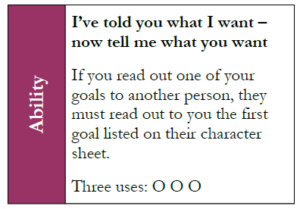This could probably be filed in the “should have done this sooner” drawer. We’ve just finished an analysis of our many and various abilities. We’ve copied all the abilities into a single spreadsheet so that we have everything in one place.
(“What’s an ability?” you ask. Well, each character in our murder mystery games has three abilities that give them an advantage in the game. Abilities range from forcing another player to tell them something, winning a rock-paper-scissors challenge, to being tougher to beat in combat.)
And now that we can see all 500+ abilities in one place, we’re marvelling at some of the contradictions.
For example, we found eight different variations on the Not so Fast! ability. We found some abilities that had different wordings in the same game. We found some abilities that have different effects in different games.

All this leads to inconsistency – we don’t want you to have to relearn the abilities every time you play. Once you’ve learned Not so Fast! you shouldn’t have to re-learn it.
This has crept up on us over time. Our approach to abilities has changed over time. As an example, an early version of Sudden Insight states “After talking for five minutes with any person, you realise that they revealed more than they intended. They must show you everything on their “Information” card.” Feedback from players suggested that some players were timing themselves to the second so that they could play the ability. That wasn’t really what we intended – we just wanted them to talk for a short while. So later versions said “After talking briefly to …” or even just “After talking to…”. But we didn’t then go back and change the original abilities.
So we’ve agreed on some standardised wordings for our “standard” abilities, the ones we use time and again. For example, Sudden Insight will now say: “After talking to another player, you realise that they have revealed more than they intended. They must must show you their Clue.” (As discussed previously, Clue is our new term for Information.)
And we’re going to sort out all our old games and bring them up to standard. (This isn’t going to happen overnight, obviously.)
So when you see Sudden Insight in Court in the Act, you know that it’s going to have the same effect as Sudden Insight in Casino Fatale.
The only things that may change are flavour text and restrictions. We sometimes use flavour text to give the abilities a bit of colour and make them fit the character. And in some cases we put a restriction on an ability (in Happy Birthday R.J. the Harrington Stock cannot be pickpocketed, for example). However, neither flavour text or restrictions change the basic effect of the ability. We will also ensure that the balance of abilities is about right.
For example, Hollywood Lies currently has over 20 versions of “I love talking to people – I never know what I’m going to learn!” We’re going to replace some of those with abilities that do slightly different things so that there’s a good variety.
First games to get the new abilities will be Lord and Lady Westing’s Will and Death on the Gambia.




In the “The Night before Christmas” game, since anyone can say/reveal anything they want to, on what basis can I declare “You’ve revealed more than you intended.” to another player, requiring them to reveal their Secret? The only thing that I can think of is if they say something like “oh, wait, I didn’t mean to reveal that”. What is an example of me just “realizing” that they revealed more than they intended? Inadvertently handing me their Abilities page? Something else?
Hi Glen, thanks for this question! To use the ability, the victim doesn’t need to have actually revealed more than they intended. The idea is that it represents a situation where the character with the ability, by means of skilled and probing questioning, tricks the victim into blurting their Secret while in what they thought would be an innocent conversation. but we don’t require the player with the ability to be able to simulate this in real life, as it would be quite demanding. So, the way it works is: just have an ordinary conversation with the victim, show the ability, and they must reveal their Secret to you. If you want to role-play a devious and probing line of questioning, to make this feel justified, then that’s absolutely fine of course — but it’s not necessary.